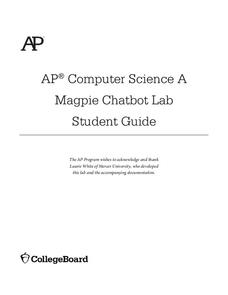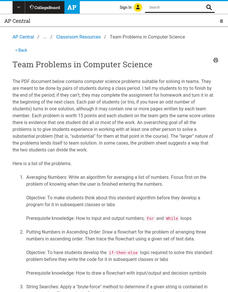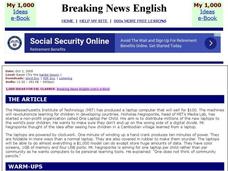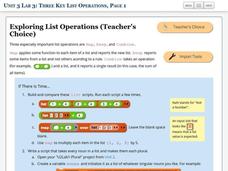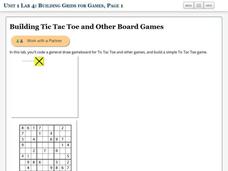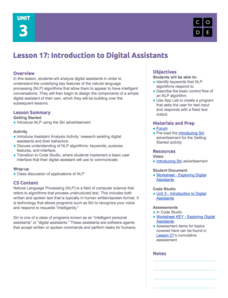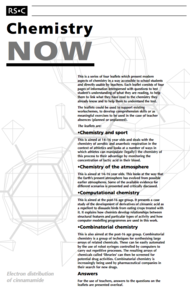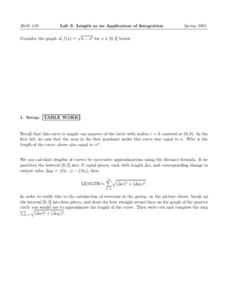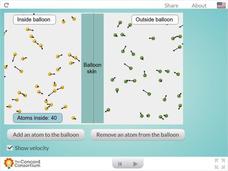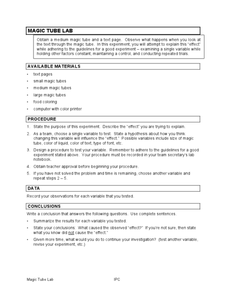College Board
AP® Computer Science A: Magpie Chatbot Lab Student Guide
How is your computer or phone able to talk to you? Explore the tasks needed for a computer to understand human voice input and then write code for a Chatbot with this lab guide.
College Board
AP® Computer Science: A Picture Lab Student Guide
How do you modify digital pictures? In this lab learners write methods that modify digital pictures. They how to traverse a two-dimensional array of integers or objects, and are introduced to nested loops, binary numbers,...
College Board
AP® Computer Science A: Elevens Lab Student Guide
Looking for a project to use in an AP® Computer Science class? Engage learners with a simple solitaire game called Elevens. Through these activities, learners break down the task and write the code for a game. Sign in to your College...
College Board
Team Problems in Computer Science
There is no I in team. Seven team problems provide classmates the opportunity to work with a partner on a task. Projects span the course and require pupils to apply their knowledge. Tasks range from writing the algorithm in English to...
Curated OER
Breaking News English: One Hundred Dollar Laptop Computer
In this one hundred dollar laptop computer worksheet, learners read the article, answer true and false questions, complete synonym matching, complete phrase matching, complete a gap fill, answer short answer questions, answer discussion...
Beauty and Joy of Computing
Three Key List Operations
Develop an understanding of the Map, Keep, and Combine operations. The lab leads the class through the exploration of three list operations. Each task contains a self-check to measure scholars' understanding of the operation in the...
Beauty and Joy of Computing
Combining List Operations
Use list operations to modify an earlier version of Tic Tac Toe. The fourth lab in a series of five has pupils combine list operations to build more powerful operations. They take a project from a previous unit and enhance it to keep...
Beauty and Joy of Computing
Conditional Blocks
If you use the resource, then pupils will understand conditional block instructions. In the first lab of a six-part unit, pupils learn how to use conditional statements (if/then) in block instructions for computer programming. They apply...
Beauty and Joy of Computing
Sprite Drawing and Interaction
Discover how to program objects to move on a screen. In the second lab of a five-part unit, each learner uses block instructions to program a sprite to follow their mouse (cursor). They investigate how to use these same block...
Chicago Botanic Garden
Leaf Litter Ecology Lab
Some organisms spend their entire lives in leaf litter. The third in a series of six is a great lesson exploring the community of leaf litter. Groups gather and then spread leaf litter over white paper and remove leaves/twigs while...
Beauty and Joy of Computing
Nesting Lists
Create lists within lists. The second lab in a series of five in the unit has pupils develop a simple contact list app. The tasks within the lab build the need for an abstract data type. Individuals build more complexity into their...
Beauty and Joy of Computing
Search Engines
Which search engine is best? The last lab in a unit of five leads the class to investigate search engines. Working in groups, individuals read and discuss articles related to searching the Internet. Pupils develop suggestions that...
Beauty and Joy of Computing
Building Grids for Games
You can't play Tic Tac Toe without grids. In the fourth lab of a five-part unit, scholars learn how to build grids for games such as Tic Tac Toe. Along the way, they also learn about reporter blocks that perform calculations.
Code.org
Introduction to Digital Assistant Project
How does a computer recognize voice commands? Scholars learn about digital assistants and natural language processing (NLP) algorithms in the ninth instructional activity of the series. They begin building a simple digital assistant and...
Royal Society of Chemistry
Computational Chemistry—Chemistry Now
Can some plants make their own animal repellents? Science sleuths examine the properties of cinnamamide in pear trees using an case study about computational chemistry. The resource discusses how vital computers are to research, how...
Beauty and Joy of Computing
Building an App
Create your own app with the first lab of a five-part unit. Future computer scientists learn the basics of programming a game application. They use a given software program to design an app where users try to click on a moving...
Curated OER
Lab 3: Length as an Application of Integration
In this integration worksheet, students graph a function that is a quarter circle curve. They calculate lengths of curves by approximation using the distance formula. Students use a computer program to calculate the approximation of the...
Magic of Physics
Unit Converter I
Talk about a cool tool! Convert between units with the click of a mouse using a handy online resource. Enter the starting measurement and units for quantities such as torque, speed, and inertia, then sit back and relax while the computer...
Curated OER
Projectile Motion Lab
For this physics worksheet, students model the position, velocity and acceleration using mathematical formulas and a computer program. Then they interpret the parameters in each of the models. Students also complete the experiment and...
Concord Consortium
What Is Pressure?
Balloons bring great fun to the classroom, until they break. What's a teacher to do then? Break out the balloon of the computer age with a fun interactive! Science scholars add and remove atoms from their virtual balloons and observe...
Columbus City Schools
The Mystery of Earth’s History
Every living creature can leave a fossil record, yet most fossils belong to extinct organisms rather than ones currently living. Scholars learn about dating rock layers, fossils, and the environment of the past. Pupils understand that...
Curated OER
Plastic Identification Lab
In this plastics worksheet, students experiment with an unknown plastic and determine the polymer name and resin code by using a flow chart of various tests. They answer five questions after they collect their data.
Curated OER
Magic Tube Lab
In this scientific investigation instructional activity, students use "magic tubes" to make observations, hypothesize, study variables in experiments, write procedures, and draw conclusions.
Concord Consortium
Diffusion Across a Semipermeable Membrane
Semipermeable membranes allow water to go through—but not larger molecules. The simulation encourages pupils to adjust the membrane pore size to understand how this works. It also provides a way to trace the movement of a single molecule.
